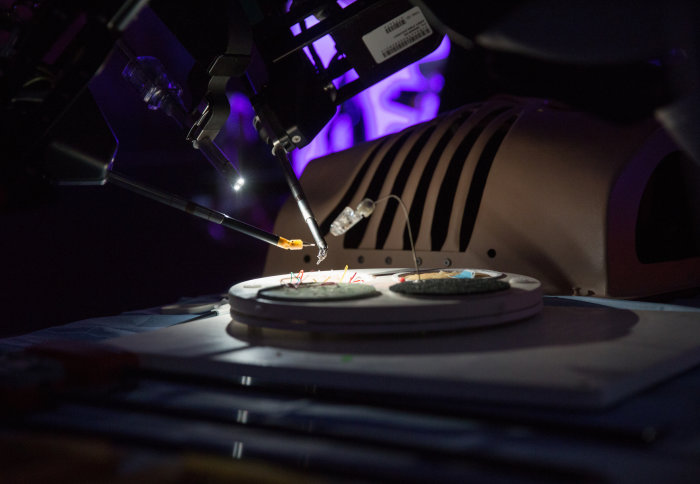£5m grant to kickstart pioneering MedTech accelerator led by Imperial

Imperial's Hamlyn Centre for Robotic Surgery
An Imperial-led project to rapidly translate new medical technologies into clinical solutions has received £5m government funding.
Together we will build enduring value in medical technologies. The benefits will be felt by patients throughout the UK and around the world Professor Nick Jennings Vice-Provost (Research and Innovation)
The investment, made through Research England’s Connecting Capability Fund, will support the MedTech SuperConnector (MTSC) – an ambitious programme which challenges early career researchers to turn their discoveries into new diagnostic tools, medical devices and digital healthcare solutions.
The MTSC will position the UK as a leader in MedTech development while creating a new standard for the acceleration of medical technologies to market.
Physically located across three wet-lab incubators in central London, including the Imperial White City Incubator, the MTSC will build upon the College’s vibrant entrepreneurial ecosystem and commercialisation expertise as well as those of seven partner institutions: Queen Mary University of London, Bucks New University, The Francis Crick Institute, Royal College of Art, Royal College of Music, Institute of Cancer Research and Royal Veterinary College.
Critical mass
The MTSC will provide its participants with the funding, training, mentorship and access to the industry partners and patients required to fast track the translation of their pioneering research discoveries into new medical technologies – generating startup companies in the process.

MTSC participants will receive business coaching and advice from a pool of experts that together make up the Medtech Venture Mentoring Programme (MVMP). The MVMP, modelled on Imperial’s existing Venture Mentoring Service, is comprised of industry professionals, including corporate partners, startups, the NHS and other healthcare providers.
During its first three years, the MTSC will deploy different acceleration approaches to determine a best-practice model for the MedTech sector.
Professor Nick Jennings, Vice-Provost (Research and Enterprise) said: “Imperial has a proud history of taking research out of the lab and into the world. We are constantly thinking about where the next innovation like penicillin, IVF or the i-Knife might come from. The MedTech SuperConnerctor will create a critical mass of brilliants minds, working across institutions to develop new technologies, tools and digital solutions to healthcare challenges.
“This project sees us working with many new academic and industrial partners. Together we will build enduring value in medical technologies. The benefits will be felt by patients throughout the UK and around the world.”
Collaboration
The Connecting Capability Fund supports universities in working together, and with businesses and other partners, to commercialise research and share good practice and capacity. The Fund is highlighted in the Government’s Industrial Strategy and will help achieve its aims of enhancing UK industrial competitiveness and productivity. It builds on established processes and success of Research England’s HEIF programme.
The Imperial grant forms part of a £67million investment in 14 collaborative projects between universities and with other partners to drive forward world-class university commercialisation across the country.

Imperial is also supporting another project, led by King’s College London, which seeks to strengthen London’s position as a world centre of commercialisation in medical technologies through a consortium focussed on advanced therapies.
Business Secretary Greg Clark said: “Britain is famous for its innovations. From the humble toothbrush to hip replacements, the ATM to the World Wide Web – these inventions have had a huge impact on our daily lives. Up and down the UK, some of the brightest and best talent are undertaking research which can deliver extraordinary innovations that will transform our society for the better.
“Through the Industrial Strategy, Grand Challenges and the funding announced today, we are helping turn innovative new ideas into products and services which could help change our lives and keep the UK as a world leader in developing the products of tomorrow.”
World class science
David Sweeney, Executive Chair of Research England, said: “These projects demonstrate the commitment of universities to work together to strengthen the R&D and technological capabilities of the UK, building upon our successful Higher Education Innovation Fund (HEIF). In the Industrial Strategy, the Government asked us to improve our ability to turn exciting ideas into commercial products and services. Universities have stepped forward in these projects to show that they can do world class commercialisation, alongside world class science.
“I believe these projects present important innovations that should inform our strategic approach to commercialisation in UK Research and Innovation for the future.”

Sarah Haywood, CEO of MedCity said: “Even with the most innovative idea in the world, the journey from bench to bedside can be long and challenging; from understanding patient demand and setting up patient trials, through to pitching for investment and navigating the UK healthcare system.
“Imperial’s MedTech SuperConnector offers a unique opportunity for post-doc researchers, who have discoveries within MedTech, to take their research through to market by providing the best entrepreneurship education, incubation and prototyping facilities from across eight fantastic academic institutions.
“This Research England-funded project, alongside the Advanced Therapies Consortium led by King’s College London, will ensure that London is strengthened as a world-centre for commercialisation of MedTech.”
Article text (excluding photos or graphics) © Imperial College London.
Photos and graphics subject to third party copyright used with permission or © Imperial College London.
Reporter
Deborah Evanson
Communications Division